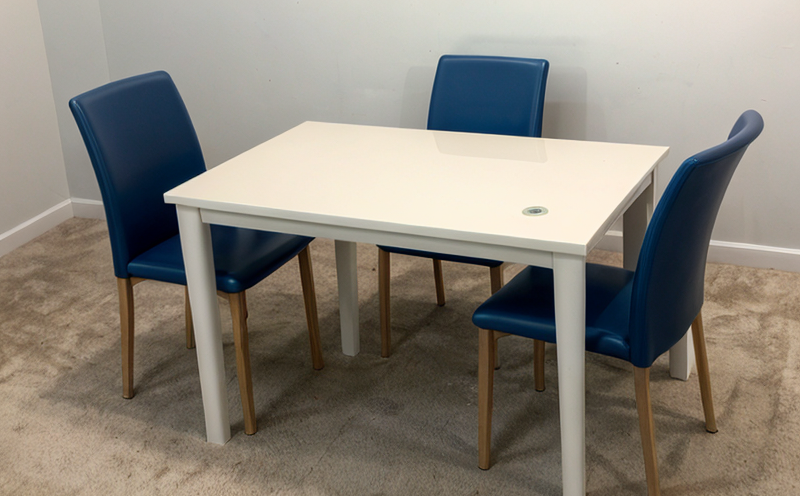NF EN ISO 846 Microbial Resistance Testing of Interior Plastics
The NF EN ISO 846 standard pertains to the microbial resistance testing of interior plastics used in furniture and other household goods. This rigorous procedure is designed to ensure that materials are capable of resisting contamination by microorganisms, which can lead to issues like deterioration or health hazards.
This test method involves exposing the plastic samples to a standardized suspension of microorganisms under controlled conditions. The specimens are then evaluated for their resistance post-exposure. This process typically includes:
- Preparation of the microbial inoculum according to ISO 846 requirements.
- Cultivation and incubation at specified temperatures and durations.
- Evaluation of specimen integrity, appearance changes, and resistance levels post-testing.
The standard applies specifically to plastics used in interior furnishings such as chairs, sofas, and other home goods. It is crucial for ensuring that these products remain hygienic and safe for consumer use over extended periods.
Testing according to NF EN ISO 846 provides manufacturers with a competitive edge by demonstrating compliance with international standards. This is particularly important in the global market where regulatory requirements can vary significantly from country to country. By adhering strictly to this standard, companies can ensure their products meet the highest hygiene and safety benchmarks.
The process involves meticulous specimen preparation, which includes selecting representative samples that accurately reflect the intended use of the plastic material. This ensures the test results are reliable indicators of real-world performance. The testing apparatus used is precise, ensuring consistent and reproducible outcomes across multiple trials.
Acceptance criteria for NF EN ISO 846 include not only the resistance to microbial growth but also the retention of physical properties such as color and texture post-exposure. This comprehensive approach guarantees that plastics remain aesthetically pleasing and functional even after prolonged exposure to potentially harmful environments.
The importance of this testing cannot be overstated, especially in a rapidly evolving market where consumer expectations regarding product safety and hygiene are at an all-time high. By incorporating NF EN ISO 846 into their quality control processes, manufacturers can confidently address regulatory requirements while also enhancing brand reputation.
In conclusion, NF EN ISO 846 microbial resistance testing is a vital component of ensuring the longevity and safety of interior plastics used in furniture and other household goods. It provides a robust framework for assessing material performance under real-world conditions, thereby supporting both compliance with international standards and the broader goals of quality assurance.
Benefits
The NF EN ISO 846 testing method offers numerous benefits to manufacturers in the furniture and interior plastics sector. Firstly, it ensures that products meet stringent international hygiene standards, thereby enhancing consumer confidence and satisfaction.
- Enhanced Product Quality: By adhering to this standard, companies can guarantee their products are free from microbial contamination, thus maintaining high quality throughout the product lifecycle.
- Regulatory Compliance: This testing method helps manufacturers comply with global regulations and standards, ensuring that they meet international benchmarks for hygiene and safety.
- Increased Market Access: Meeting these standards can open new markets where regulatory compliance is a key factor. It also strengthens the brand’s reputation in existing markets.
In addition to these direct benefits, NF EN ISO 846 testing contributes indirectly by fostering innovation and continuous improvement within R&D departments. This ensures that manufacturers are always at the forefront of safety and hygiene practices.
The standard also supports procurement decisions by providing a clear framework for selecting suppliers who meet high standards of quality control. This leads to more reliable supply chains, ultimately enhancing the overall product performance and durability.
Ultimately, NF EN ISO 846 testing is an investment in long-term success, helping manufacturers build trust with consumers while maintaining competitive edge in a rapidly changing market environment.
Environmental and Sustainability Contributions
- Reduction of Microbial Growth: By ensuring that plastics used in interior furnishings are resistant to microbial growth, NF EN ISO 846 helps prevent the spread of harmful microorganisms. This is particularly beneficial for environments where hygiene is paramount.
- Prolonged Product Life: Resistant materials reduce the need for frequent replacement, thereby minimizing waste generation and resource consumption.
- Eco-Friendly Manufacturing: The use of resistant plastics can lead to more efficient manufacturing processes by reducing rework due to contamination issues. This contributes positively to overall sustainability efforts.
The NF EN ISO 846 standard thus plays a crucial role in promoting sustainable practices within the furniture and interior plastics industry, contributing not only to environmental conservation but also to economic efficiency through reduced resource consumption and waste generation.
Competitive Advantage and Market Impact
The NF EN ISO 846 microbial resistance testing is a key differentiator for furniture and interior plastics manufacturers. Compliance with this standard not only ensures product quality but also opens up new market opportunities where regulatory compliance is essential.
By ensuring that their products meet the highest hygiene and safety standards, companies can build strong brand reputations. This reputation translates into increased consumer trust and loyalty, which are critical factors in today’s competitive market environment.
In addition to enhancing brand image, NF EN ISO 846 compliance also supports procurement strategies by enabling manufacturers to select suppliers who meet stringent quality control benchmarks. This leads to more reliable supply chains, ultimately ensuring consistent product quality across different production batches and locations.
The standard’s focus on microbial resistance is particularly relevant in the current context of heightened awareness about hygiene and safety issues. By demonstrating adherence to this standard, manufacturers can effectively address consumer concerns and expectations, thereby gaining a competitive edge over non-compliant competitors.
Moreover, NF EN ISO 846 testing contributes to broader sustainability goals by promoting the use of durable materials that reduce waste generation and resource consumption. This aligns with growing consumer demands for eco-friendly products and supports long-term business strategies aimed at reducing environmental impact.





